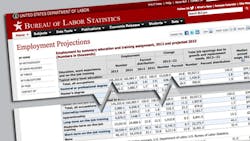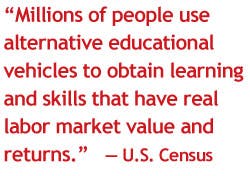The Manufacturer's Agenda: Fixing Our Workforce Education and Training Mistakes
It seems we've finally concluded that we've gotten workforce education and training all wrong for the past two decades, and it's time to fix it. Lots of theories exist for the whys and wherefores of our missteps, but I think it boils down to one: We had devalued the manufacturing sector generally, and production work -- even skilled production work -- specifically.
During the '80s and '90s, our business and public policy leaders placed their bets on creating the "post-industrial" economy comprised of "higher-value-added" work. In this vision, all kids would go to college, learn a profession and, ultimately, earn high wages. Our new economy would be built on services and knowledge and finance, not on what was viewed -- incorrectly even then -- as mere brawn on the factory floor.
What they didn't understand was that production work also would evolve. While they weren't paying attention, manufacturing innovated and production grew more sophisticated, requiring new skills, knowledge of new technologies and more smarts.
Our education system -- looking the other way with the blessing and encouragement of other business and public policy leaders, regrettably including too many manufacturing business leaders -- not only failed to keep up with the needs of fast-changing production processes; they all but dismantled the infrastructure that should have evolved to address it.
Meanwhile, academic achievement was touted as the road to personal and national growth, with federal statistics measuring the relative earnings of each academic degree -- and declaring those not achieving academically were doomed to the lower percentile of wage-earners.
The value of non-academic credentials often required for manufacturing employment -- certifications, licenses, as well as on-the-job training, internships and apprenticeships -- wasn't … even … measured.
Now we're playing catch-up.
Recently, the Bureau of Labor Statistics began to analyze and report data about non-academic knowledge and skills development, albeit in an addendum to the standard "Earnings and Unemployment Rates by Educational Attainment" chart.
Meanwhile, the U.S. Census in January released "Measuring Alternative Educational Credentials: 2012," which recounts progress in identifying how this type of education and training "fit[s] in the larger structure of a capable twenty-first century workforce." Their finding: "Millions of people use alternative educational vehicles to obtain learning and skills that have real labor market value and returns."
Though manufacturing is only one industry explored in the government statistics and reports, these efforts point us in the right direction: toward valuing the knowledge and skills of -- and respect for -- our nation's skilled production workers.
Manufacturing executives should applaud and encourage this type of research and reporting.
About the Author
Patricia Panchak
Patricia Panchak, Former Editor-in-Chief
Focus: Competitiveness & Public Policy
Call: 216-931-9252
Follow on Twitter: @PPanchakIW
In her commentary and reporting for IndustryWeek, Editor-in-Chief Patricia Panchak covers world-class manufacturing industry strategies, best practices and public policy issues that affect manufacturers’ competitiveness. She delivers news and analysis—and reports the trends--in tax, trade and labor policy; federal, state and local government agencies and programs; and judicial, executive and legislative actions. As well, she shares case studies about how manufacturing executives can capitalize on the latest best practices to cut costs, boost productivity and increase profits.
As editor, she directs the strategic development of all IW editorial products, including the magazine, IndustryWeek.com, research and information products, and executive conferences.
An award-winning editor, Panchak received the 2004 Jesse H. Neal Business Journalism Award for Signed Commentary and helped her staff earn the 2004 Neal Award for Subject-Related Series. She also has earned the American Business Media’s Midwest Award for Editorial Courage and Integrity.
Patricia holds bachelor’s degrees in Journalism and English from Bowling Green State University and a master’s degree in Journalism from Ohio University’s E.W. Scripps School of Journalism. She lives in Cleveland Hts., Ohio, with her family.



